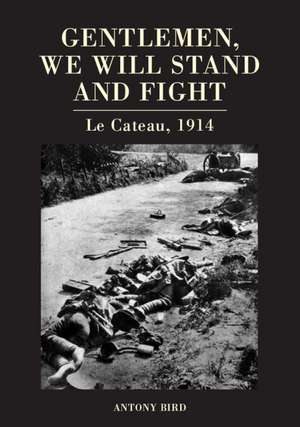Gentlemen, We Will Stand and Fight
Autor Antony Birden Limba Engleză Hardback – 14 dec 2008
At Le Cateau on 26 August 1914, the commanders of the Second Corps of the British Expeditionary Force elected to fight the German First Army and, although outnumbered three to one, delivered such a smashing blow to the German invaders that the whole of the BEF was able to continue the Retreat to Compiegne without being seriously threatened. Although the British suffered 1,200 of their men and officers killed, and were forced to leave their dead and many of their wounded on the battlefield, as well as thirty-six of their field guns, they inflicted losses on von Kluck's army of nearly 9,000. Yet the architect of this feat of arms, Second Corps commander Sir Horace Smith-Dorrien, was sacked soon afterward, while First Corps commander Sir Douglas Haig, who had performed far less impressively, took command of the whole BEF. Antony Bird describes the battle, its aftermath and he examines the men, the weapons and the tactics that made this feat of arms possible.
Preț: 137.80 lei
Nou
Puncte Express: 207
Preț estimativ în valută:
26.37€ • 27.74$ • 21.89£
26.37€ • 27.74$ • 21.89£
Carte indisponibilă temporar
Doresc să fiu notificat când acest titlu va fi disponibil:
Se trimite...
Preluare comenzi: 021 569.72.76
Specificații
ISBN-13: 9781847970626
ISBN-10: 1847970621
Pagini: 206
Ilustrații: 31 black & white photographs, 7 maps
Dimensiuni: 160 x 236 x 20 mm
Greutate: 0.61 kg
Editura: Crowood Press (UK)
ISBN-10: 1847970621
Pagini: 206
Ilustrații: 31 black & white photographs, 7 maps
Dimensiuni: 160 x 236 x 20 mm
Greutate: 0.61 kg
Editura: Crowood Press (UK)
Notă biografică
Antony Bird has an MPhil from University College London. With his brother Nick Bird, he regularly conducts tours of the battlefields of the Western Front and Gallipoli. In 2006 Antony and Nick Bird were the co-editors of Eyewitness to War, their personal collection of the most vivid and eloquent writing on war. He is a resident of Chichester, England.
Descriere
At Le Cateau on 26 August 1914, the commanders of the Second Corps of the British Expeditionary Force elected to fight the German First Army and, although outnumbered three to one, delivered a smashing blow to the German. Although the British suffered 1,200 of their men and officers killed they inflicted losses on von Kluck's army of nearly 9,000. Yet the architect of this feat of arms, Second Corps commander Sir Horace Smith-Dorrien, was sacked soon afterward, while First Corps commander Sir Douglas Haig, who had performed far less impressively, took command of the whole BEF. Antony Bird describes the battle, its aftermath and he examines the men, the weapons and the tactics that made this feat of arms possible.
